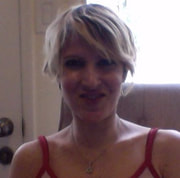I, personally, orient myself to broad views of the meaning of "family." My family is large and diverse, some feel more at home than others; some I enjoy, and others I find challenging. When my father passed on three years ago-having lost both parents in my thirties-my small circle of very dear friends and I "do family." Breaking bread with non-biological "family," sharing laughter, love and/or sorrow with my very dear friends, conjure up and take me to moments in my own family-of-origin. And, when my sis, cousin, and nieces get together, we do family too. Family, therefore, is experienced by me as a state of fondness and love, which undoubtedly transcends blood. Taking the concept to the highest level of abstraction, "the family of humankind," feels right and good. The ancient to the contemporary ideologies/philosophies/theologies that disseminate and strive to embody this message add healing and beauty to our world. I digress....
Part of my dissertation research focused on professionals who address family life issues. My participants included family life educators who are professors, authors, clergy and therapists. I wanted to explore the meaning of "family" and the implications of these meanings.
One theme that emerged in my dissertation, "Defining Family With Integrity," came from one of my participants. Some individuals are not spared difficult upbringings; they rightfully create and "do family" in adaptive ways. Moreover, traditional notions of family are being expanded to include diverse family forms. If family is a sacred space of sorts where we learn to live, forgive and love well, this is a positive development.
Below is an excerpt from my dissertation on the experience of Sebastian (pseudonym to preserve confidentiality), who is a professor and clergy person.
Defining Family With Integrity
Defining family with integrity is a theme that reflects what appears to be participants’ deep understanding of the complexities involved in modern family life, which translates to a moral component, integrity. At its core, the quality of integrity bespeaks to one’s ability to have actions in consonance with one’s belief systems. Participants' lived experiences with family diversity appear to stretch their understandings.
For example, Sebastian describes: “family diversity is pretty much who we are in my own family.” Sebastian has personal experience, which appears to lend itself to greater receptivity and an expansive view of family for others. Sebastian’s intellectual and emotional movement is experienced rather poignantly:
"It’s harder and harder to think of how you’d define family in structural ways. If you could take it for granted that
everybody is going to get married and have their own biological children and that was it, instead of living together and having
children, but not getting married. Or bringing children from different marriages. Or even being same-sex and adopting
children or one of them is artificially inseminated. You know? And I’m not willing to say this is a family and this is [not]-even, even if it’s not on ideological grounds, but on the basis of saying, being able to say…I can’t with integrity! I’m going to draw the boundary here (of a family); it’s indefensible…in terms of trying to defend a particular version of family… I need to wrestle with the question."
In this example, Sebastian captures the complexity of family diversity issues, ethics, and the broader responsibilities he experiences. The movement appears to be experienced as follows: Sebastian has 1) an experience of diversity in his own family, 2) an intellectual and ideological grasp of the complexity, 3) a moral orientation that subjugates a response of defining family circumscribed to particulars, in favor of “wrestling with the question.” Here, Sebastian experiences a virtue he values as a human self and a self of the FLE: integrity.

 RSS Feed
RSS Feed
